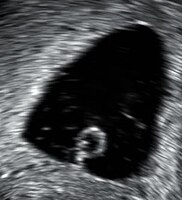
Photo from wikipedia
Purpose To identify predictors of complete miscarriage after expectant management or misoprostol treatment of non-viable early pregnancy in women with vaginal bleeding. Methods This was a planned secondary analysis of… Click to show full abstract
Purpose To identify predictors of complete miscarriage after expectant management or misoprostol treatment of non-viable early pregnancy in women with vaginal bleeding. Methods This was a planned secondary analysis of data from a published randomized controlled trial comparing expectant management with vaginal single dose of 800 µg misoprostol treatment of women with embryonic or anembryonic miscarriage. Predefined variables—serum-progesterone, serum-β-human chorionic gonadotropin, parity, previous vaginal deliveries, gestational age, clinical symptoms (bleeding and pain), mean diameter and shape of the gestational sac, crown-rump-length, type of miscarriage, and presence of blood flow in the intervillous space—were tested as predictors of treatment success (no gestational sac in the uterine cavity and maximum anterior–posterior intracavitary diameter was ≤ 15 mm as measured with transvaginal ultrasound on a sagittal view) in univariable and multivariable logistic regression. Results Variables from 174 women (83 expectant management versus 91 misoprostol) were analyzed for prediction of complete miscarriage at ≤ 17 days. In patients managed expectantly, the rate of complete miscarriage was 62.7% (32/51) in embryonic miscarriages versus 37.5% (12/32) in anembryonic miscarriages ( P = 0.02). In multivariable logistic regression, the likelihood of success increased with increasing gestational age, increasing crown-rump-length and decreasing gestational sac diameter. Misoprostol treatment was successful in 80.0% (73/91). No variable predicted success of misoprostol treatment. Conclusions Complete miscarriage after expectant management is significantly more likely in embryonic miscarriage than in anembryonic miscarriage. Gestational age, crown-rump-length, and gestational sac diameter are independent predictors of success of expectant management. Predictors of treatment success may help counselling women with early miscarriage.
Journal Title: Archives of Gynecology and Obstetrics
Year Published: 2020
Link to full text (if available)
Share on Social Media: Sign Up to like & get
recommendations!